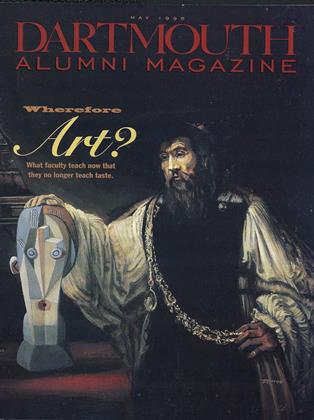Don't believe the Hollywood version of the Wild West. According to visiting professor of English Sharon Bryan, who teaches creative writing, life in the nineteenth-century West wasn't so much wild as it was down to earth.
Three years ago, during centennial celebrations in Eureka, Utah, Bryan stumbled on a photograph of her long-dead great-grandfather Holland Gear, a miner who became Eureka's mayor and helped found the town's schools. The picture lured her into a crosscountry quest to find out more about western life in the last century. Traveling to Illinois, Nevada, Vermont, Idaho, and the South, Bryan came across the family stories Holland Gear would have heard as a child: how his father tried to strike it rich in the Gold Rush; and how his great-uncle Hezekiah made a fortune in lead, gave generously to improve his town, and died penniless when, according to local lore, "his right hand lost its cunning." Bryan is weaving these and other tales from her family's mining life into a book, Shaping Stories: How We Tell Ourselves Who We Are.
According to novelist Ernest Hebert, her English department colleague, Bryan is onto something. "What she's unearthed about her pioneer ancestors flies in the face of the myths of the American West. The people are not violent and individualistic; they're peaceful and community-oriented," Hebert says. Ele has even suggested that Bryan's book constitutes a genre of its own: the Counterwestern.
Go ahead, have a nice day: Prof Sharon Bryan says the early West was less wild than we think.
 View Full Issue
View Full Issue
More From This Issue
-
 Cover Story
Cover StoryWha is There to Teach About Art?
May 1996 By Rebecca Bailey -
 Feature
FeatureThe Art of Collecting
May 1996 By Diane Cyr -
 Feature
FeatureA Mini-Seminar On Two Hood Pieces
May 1996 -
 Feature
FeatureGuardian of Halos
May 1996 By Carl Little '76 -
 Feature
Feature9 Reasons Why the Hood Bought This Painting
May 1996 -
 Article
ArticleVisions of the Ancestors
May 1996 By Karen Endicott
Article
-
 Article
ArticleCOLLEGE NOTES
November, 1908 -
 Article
ArticleThree Minutes and One Second
APRIL 1988 -
 Article
ArticleA Noted Name Turns Up Again in Green Skiing
APRIL 1963 By ERNIE ROBERTS -
 Article
ArticleBig Green Teams
June 1974 By JACK DE GANGE -
 Article
ArticleProf's Choice
DECEMBER 1998 By Professor Judy Worman -
 Article
ArticleBack-Stage with the Players
APRIL 1932 By Robert Guggenheim '33

